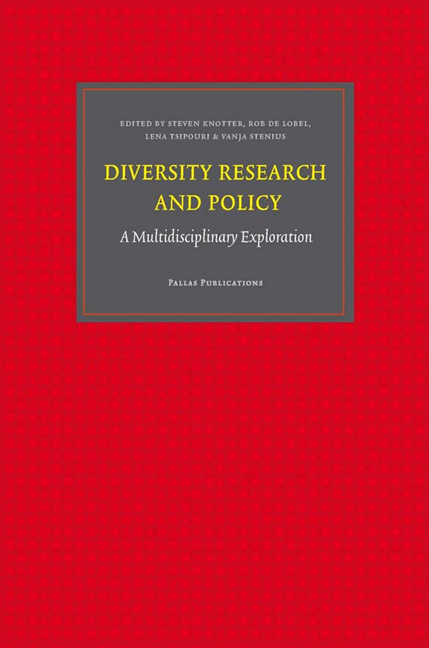Book contents
- Frontmatter
- Contents
- Acknowledgements
- 1 An Introduction
- 2 Diversity and Social Anthropology
- 3 Diversity and Sociology
- 4 Diversity and Criminology
- 5 Diversity and Ecology/Ecological Economics
- 6 Linguistic Diversity
- 7 Diversity and Architecture
- 8 Diversity and Urban Planning
- 9 Diversity and Economics
- 10 Diversity and Diversity Management in Business and Organisation Studies
- 11 Diversity and (Organisational) Psychology
- 12 Diversity and Law
- 13 Diversity and Public Policy
- 14 Conclusion
- About the Authors
- About the Reviewers
12 - Diversity and Law
Published online by Cambridge University Press: 15 January 2021
- Frontmatter
- Contents
- Acknowledgements
- 1 An Introduction
- 2 Diversity and Social Anthropology
- 3 Diversity and Sociology
- 4 Diversity and Criminology
- 5 Diversity and Ecology/Ecological Economics
- 6 Linguistic Diversity
- 7 Diversity and Architecture
- 8 Diversity and Urban Planning
- 9 Diversity and Economics
- 10 Diversity and Diversity Management in Business and Organisation Studies
- 11 Diversity and (Organisational) Psychology
- 12 Diversity and Law
- 13 Diversity and Public Policy
- 14 Conclusion
- About the Authors
- About the Reviewers
Summary
A Brief Description of the Discipline of Law
Every society is characterised by an at least emerging set of rules and principles, established by an (accepted) authority or authoritative body, that form “a body of rules of conduct of binding legal force and effect, prescribed, recognised, and enforced by controlling authority” (the Free Dictionary by Farlex) forming its law, or legal system. The concept of law is complex. It occurs in multiple contexts and disciplines, and should be viewed from both a historical and a geographical point of view, in a society/country-specific perspective, in its evolution. A recurring issue throughout history has been the conceptual distinction between natural law – perceived as the embodiment of immovable moral principles of divine origin, in between divine infallibility of a religious ethical nature (Aquinas, Hobbes) and human rationality uncovering a universal good/natural goodness merging in conceptual moral righteousness of an ethical philosophical nature (Aristotle, Rousseau, Locke, Grotius) – and legal positivism (Austin, Bentham), affirming the superiority of written sources of law and derived jurisprudence, which are by definition man-made and capable of adapting to societal realities in development. A conceptual dichotomy is also made between individual and collective rights to be protected by the law, rights and duties legally defined as privilege and obligation, as well as a wide typology of law expressing specialised normative needs in a variety of human and societal contexts on different levels within the society and between societies (among states).
From a juridical point of view, the concept of law refers to rules or a system of rules (written or unwritten) developed in time by a community, society or government to regulate the relationships within the respective community or society through assigned authorities and enforced through a set of specific institutions. The law is inherently normative and implies among others sociological, anthropological and philosophical aspects, along with political and other implications. Historically, even relatively undeveloped societal formations such as tribes have developed their own normative legal system (ancient/tribal law) reflecting their level of development, their cultural and (if appropriate) religious individuality as well as political power structures, arguably in an emic/etic perspective. A subject of dispute elucidates the conditions of legal validity and explaining the normativity of the law in different societies and timeframes, i.e., the nature of law as normative social practice shaping human behaviour.
- Type
- Chapter
- Information
- Diversity Research and PolicyA Multidisciplinary Exploration, pp. 191 - 214Publisher: Amsterdam University PressPrint publication year: 2012



